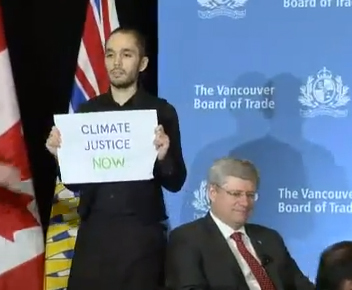Stephen Harper is hoping that climate change will not become an issue in the October 19 federal election.
As we approach both the election and the pivotal United Nations climate summit in Paris just weeks afterwards, CBC national affairs editor Chris Hall writes, “Jeffrey Phillips, managing director of the consulting firm Dawson Strategic, says the only way to have any real reduction in greenhouse gas emissions is to drastically scale back oil sands production, and that’s not going to happen.”
As such, the political context Harper is now dealing with is this. Late last year, the United States, China and Europe announced dramatic sounding — but insufficient — emission reduction targets. The United States pledged to cut their greenhouse gas emissions by 26-28 per cent below 2005 levels by 2025. At the same time, China promised to stop its emissions from growing by 2030 at the latest. Europe has set a target of an emissions reduction of 40 per cent below 1990 levels by 2030. In addition, Japan is proposing to reduce its emissions by 26 per cent below 2013 levels by 2030.
The Conservative spin to counter this given Canada will not meets its emission reduction target set in Copenhagen in 2009 nor limit the tar sands, Hall writes, is to say “the U.S. targets sound great, but mean little, because Obama has no hope of getting them through the Republican-dominated Congress. … Harper will continue to argue Canada will do its part if the world’s biggest emitters — China, Russia and the U.S. — step up with real targets. …[And he’ll argue] any attempt to put a price on carbon — including his party’s once-stated policy of curtailing emissions through what’s called cap and trade — as a tax on everything.”
Hall concludes, “So, in the run-up to Paris the calculation for the prime minister is, to put it bluntly, what political price will his Conservatives pay for not taking action on climate change in an election year, when his opponents argue they intend to do much more. Harper, one suspects, is far less worried about how world leaders will respond when he announces Canada’s climate change targets than he is about how it will play with Canadians.”
So here are three points on how this should “play” with Canadians:
- While Harper clearly will not “drastically scale back” tar sands production, University College London researchers have concluded that 85 per cent of the tar sands must not be extracted and burned if the world wants to limit global warming.
- The Canadian Energy Research Institute estimates that if tar sands output were to triple, it would provide $2,016 billion dollars in GDP over the next 25 years. That’s about $84 billion a year. But a TD report found that the financial implications of climate change will sap an estimated $5 billion from the Canadian economy by 2020 and will cost Canadians $21-$43 billion per year by 2050 given severe weather impacts like flooding and drought. Is this really the future we want?
- All countries must achieve deeper emission reductions. Open Democracy has reported, “Cambridge University number cruncher Chris Hope concluded that if the European Union countries cut emissions by 40 percent by 2030 (as they have pledged), if the rest of the developed countries follow the U.S. commitment, and if the developing countries follow China’s promise, the most likely result will be a global temperature rise of 3.6 degrees Celsius in 2100.” This despite the reality that 2 degrees Celsius is the limit that cannot be exceeded to prevent climate change from having devastating consequences.
The Council of Canadians argues that the imperative of climate justice cannot be achieved if the Harper government remains committed to the Energy East pipeline (which would be responsible for about 32 million tonnes of greenhouse gas emissions a year), the Trans Mountain pipeline (at about 270 million tonnes of greenhouse gas emissions over 35 years), the Liquefied Natural Gas agenda (given just five LNG terminals would add 28 million tonnes of greenhouse gas emissions a year) and the Site C dam (which would produce 150,000 tonnes of greenhouse gas emissions a year).
For more on our climate justice campaign, please click here. For more on our democracy and election 2015 campaign, click here.



